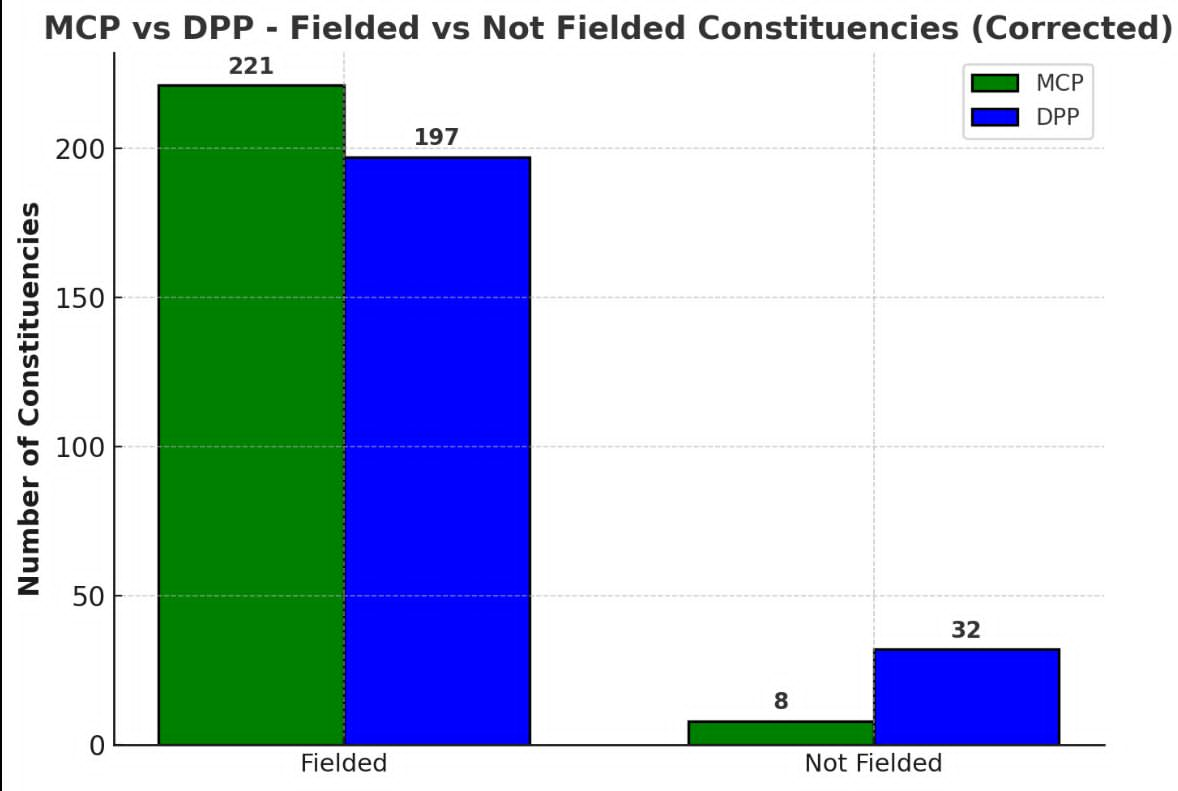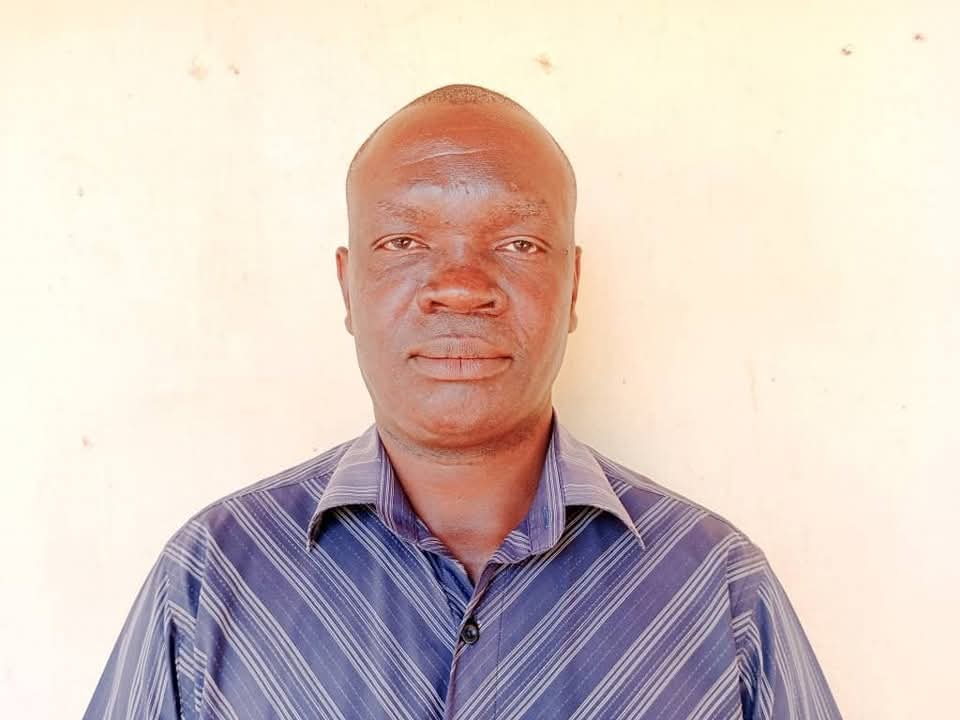By Jones Gadama
As the 2025 parliamentary elections approach, many have fixated on the Democratic Progressive Party’s (DPP) decision not to field candidates in 32 constituencies across the central region, and part of Mzimba, hastily branding it as a sign of weakness or retreat.
This narrative, however, couldn’t be further from the truth. The DPP’s move is a calculated, strategic masterstroke designed to optimize resources, consolidate power where it truly counts, and ensure a resounding electoral victory on September 16.
Far from a gamble or a sign of desperation, the party’s selective candidacy is a demonstration of political wisdom born from decades of experience and intimate knowledge of Malawi’s electoral landscape.
Let’s address the elephant in the room: these 32 constituencies—stretching across Mzimba South, Kasungu, Ntchisi, Dowa, Mchinji, Lilongwe, and Dedza—are all situated firmly in the central region, except Mzimba south which is in the northern region of Malawi.
The central region has been historically challenging for DPP to penetrate successfully.
Over many election cycles, the party has struggled to secure meaningful wins here, often losing out to the Malawi Congress Party (MCP) and other competitors.
Recognizing this, the DPP has made the astute decision to stop wasting valuable campaign time, energy, and finances in areas where the probability of victory is minimal.
This is not a retreat but a smart reallocation of effort toward constituencies where DPP’s presence is strong, and victory is within reach.
Consider this: political campaigns are not won merely by fielding candidates everywhere. Victory requires precision, focus, and efficiency.
The DPP leadership understands that spreading resources thin across constituencies where the party has little chance of winning only dilutes its impact elsewhere.
Instead, by choosing not to contest in these 32 constituencies, the DPP frees up significant resources—both human and financial—that will be redirected to battleground regions and marginal seats critical for parliamentary dominance.
Moreover, this strategic absence does not equate to political surrender. On the contrary, the DPP’s influence in these constituencies remains robust through independent candidates who, while not officially bearing the party’s banner, align with its agenda and values.
These independents serve as unofficial DPP representatives, advancing the party’s vision and keeping the DPP’s political presence alive in areas where direct contestation may not be viable or prudent.
This subtle but effective approach creates multiple fronts of influence, ensuring that the DPP’s agenda resonates even without official candidates.
Let’s take a closer look at the list of constituencies where the DPP has opted not to field candidates:
- Mzimba South Constituency (026)
- Kasungu North East Constituency (049)
- Kasungu Central Constituency (050)
- Kasungu South East Constituency (051)
- Kasungu South West Constituency (052)
- Kasungu South Constituency (053)
- Ntchisi West Constituency (056)
- Dowa Kasangadzi Constituency (061)
- Dowa Mphudzu Constituency (062)
- Dowa Central Constituency (063)
- Dowa Mndolera Constituency (064)
- Dowa North East Constituency (065)
- Dowa West Constituency (066)
- Dowa Central East Constituency (068)
- Dowa South East Constituency (069)
- Mchinji South Constituency (076)
- Lilongwe Mphande Constituency (084)
- Lilongwe Mude Constituency (085)
- Lilongwe Chiwamba Constituency (087)
- Lilongwe Machenga Constituency (090)
- Lilongwe Nkhoma Constituency (091)
- Lilongwe Mapuyu South Constituency (095)
- Lilongwe Msija South Constituency (100)
- Lilongwe Msija North Constituency (101)
- Lilongwe City Nankhaka Constituency (106)
- Lilongwe City Mtandire-Mtsiriza Constituency (107)
- Lilongwe City Masintha Constituency (109)
- Lilongwe City Kamphuno Constituency (112)
- Dedza Mlunduni Constituency (115)
- Dedza Kasina Constituency (116)
- Dedza Mtakataka Constituency (117)
- Dedza Mphunzi Constituency (122)
Every single one of these constituencies falls within the central region, except Mzimba ,a stronghold for the MCP and other parties that traditionally command the electorate there.
The DPP’s historical data and polling analyses have long shown that investing heavily in these areas yields diminishing returns. The party’s decision is a reflection of mature political strategy, not capitulation.
In contrast to the narrative that the DPP is “missing” or “absent” in these seats, the reality is that the party is playing a longer, smarter game. Deploying independent candidates with sympathies toward the DPP’s vision ensures continued influence without the direct costs and risks associated with official candidacy.
This tactic allows the DPP to maintain political relevance and leverage in the central region without overstretching itself.
Furthermore, this strategy is a testament to the DPP’s commitment to responsible governance and fiscal prudence. Politics is not about mere presence but about winning and governing.
By focusing resources on constituencies where they have a genuine chance to win, the DPP is also demonstrating to the electorate that it values efficiency and results over hollow symbolism.
This approach positions the party well to form a strong parliamentary bloc, essential for influencing national policy and delivering on campaign promises.
Critics who interpret this as a sign of weakness overlook the broader political wisdom at play.The DPP’s move contrasts sharply with the Malawi Congress Party (MCP), which fields candidates in nearly all constituencies, including those where support is marginal or non-existent.
While the MCP’s near-complete coverage might seem impressive on paper, it risks diluting their campaign’s effectiveness and spreading their resources too thinly. The DPP’s focused approach is more likely to translate into tangible wins and parliamentary strength.
Moreover, the DPP’s strategy aligns with global best practices in political campaigning.
Successful parties worldwide recognize the importance of data-driven decision-making, concentrating efforts on swing constituencies and strongholds rather than futile battles.
The DPP’s leadership has clearly taken lessons from past elections, refining its approach to maximize impact and minimize wasted effort.
It is also important to highlight that by stepping back in these 32 constituencies, the DPP is signaling confidence in its core areas, the heartlands where the party has historically performed well.
This confidence is not misplaced. With nearly 197 constituencies contested, the DPP remains a formidable force in Malawi’s political arena.
The party is poised to secure decisive victories in numerous seats, many of which are marginal and critical to the overall parliamentary balance.
The DPP’s absence from 32 central region constituencies is a deliberate, strategic move designed to optimize resources, focus on winnable seats, and maintain political influence through allied independents.
This approach demonstrates the party’s deep understanding of Malawi’s electoral dynamics and its commitment to efficient, results-driven campaigning.
Voters and political analysts should view this not as a sign of weakness, but as a testament to the DPP’s political acumen and readiness to reclaim its rightful place in Malawian governance.
As the September 16 polls draw near, it is clear that the Democratic Progressive Party’s strategy is not only intelligent but poised for success.
The party’s focused campaign will ensure that every kwacha spent and every vote cast contributes to a strong, decisive mandate. The road to victory may look different, but it is certainly well-planned and well within reach.
The DPP is not absent; it is strategically present, and its eyes remain firmly fixed on victory.
Feedback: +265 99 208 24 24



